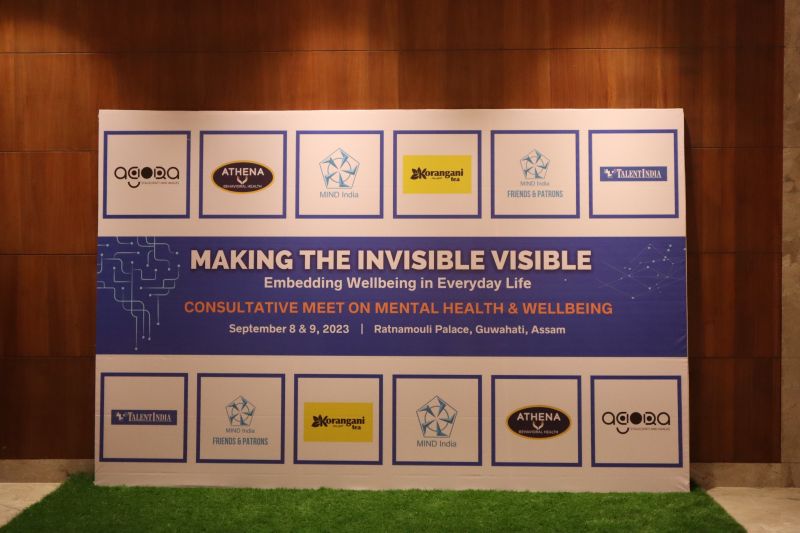Breaking The Silence: A Conversation With Dr. Shradha Malik About Mental Wellness

Table of Contents
Understanding the Stigma Surrounding Mental Health
The pervasive stigma surrounding mental health significantly hinders individuals from seeking help and receiving necessary support. This stigma manifests in various ways, impacting both personal lives and broader societal structures.
The impact of societal stigma on seeking help.
- Fear of judgment: Many people fear being judged, ostracized, or discriminated against if they disclose mental health concerns. This fear often prevents individuals from seeking professional help or even discussing their struggles with loved ones.
- Discrimination: Stigma can lead to discrimination in employment, housing, and social interactions. Individuals may worry about losing their job, facing eviction, or experiencing social isolation if their mental health condition becomes known.
- Difficulty disclosing mental health concerns: The shame and embarrassment associated with mental illness can make it incredibly challenging for individuals to open up about their struggles, even to those closest to them.
The effects of stigma are far-reaching. It can lead to delayed or forgone treatment, increased suffering, and even higher rates of suicide. For example, a study by [cite source] showed that individuals experiencing mental health challenges who perceived high levels of stigma were significantly less likely to seek professional help. This underscores the critical need to challenge and dismantle these harmful societal attitudes.
Challenging the stigma through open conversation and education.
Combating the stigma requires a multifaceted approach centered on open conversation, education, and advocacy.
- Raising awareness: Openly discussing mental health is crucial in normalizing these experiences and reducing the shame associated with seeking help. Public awareness campaigns play a vital role in educating the public about mental illness and its treatment.
- Promoting understanding: Encouraging empathy and understanding towards individuals struggling with mental health challenges is critical. Learning about mental health conditions helps reduce misconceptions and fosters a more supportive environment.
- Sharing personal experiences (if appropriate): Sharing personal stories can help break down barriers and create a sense of community for those struggling. Authentic narratives humanize mental health challenges and reduce the sense of isolation many individuals experience.
Strategies for combating mental health stigma include initiating robust educational campaigns in schools and workplaces, promoting positive portrayals of mental health in the media, and supporting mental health advocacy organizations. These collective efforts are essential for creating a culture that values mental wellness and supports those who need it.
Identifying the Signs and Symptoms of Common Mental Health Challenges
Early identification of mental health challenges is crucial for effective intervention and improved outcomes. Recognizing the signs and symptoms of common conditions like anxiety and depression is a vital first step.
Recognizing symptoms of anxiety and depression.
Anxiety and depression often manifest through a combination of physical, emotional, and behavioral symptoms.
- Physical symptoms: Anxiety may present as rapid heartbeat, shortness of breath, trembling, and muscle tension. Depression may include fatigue, sleep disturbances, changes in appetite, and unexplained aches and pains.
- Emotional symptoms: Anxiety can include excessive worry, fear, nervousness, and irritability. Depression may involve persistent sadness, hopelessness, loss of interest in activities, and feelings of worthlessness.
- Behavioral changes: Anxiety might lead to avoidance behaviors, difficulty concentrating, and restlessness. Depression may result in social withdrawal, neglect of personal hygiene, and decreased productivity.
It is vital to understand that these symptoms can vary in intensity and presentation. Early detection and intervention are key to minimizing the long-term impact of these conditions. A professional assessment is crucial for accurate diagnosis and personalized treatment.
Differentiating between normal stress and diagnosable mental health conditions.
It's important to distinguish between the normal stresses of everyday life and persistent mental health struggles. While everyone experiences stress, diagnosable conditions involve persistent and overwhelming symptoms that significantly impair daily functioning.
- Everyday stressors are temporary challenges that typically resolve over time. These can include work deadlines, relationship conflicts, or financial worries.
- Persistent mental health struggles, however, involve ongoing symptoms that interfere with a person's ability to work, socialize, and enjoy life. These may require professional intervention.
A mental health professional can accurately diagnose mental health conditions through a comprehensive assessment, taking into account the individual's history, symptoms, and overall functioning. This professional guidance is crucial for appropriate treatment planning.
Practical Strategies for Improving Mental Wellness
Improving mental wellness involves a holistic approach that incorporates lifestyle changes, professional support, and self-care practices.
Lifestyle choices that support mental wellbeing.
Making positive lifestyle choices can significantly impact mental health.
- Exercise: Regular physical activity releases endorphins, which have mood-boosting effects. Aim for at least 30 minutes of moderate-intensity exercise most days of the week.
- Healthy diet: A balanced diet provides the nutrients your body and brain need to function optimally. Limit processed foods, sugary drinks, and excessive caffeine.
- Sufficient sleep: Aim for 7-9 hours of quality sleep per night. Establish a consistent sleep schedule and create a relaxing bedtime routine.
- Mindfulness techniques: Practices like meditation and deep breathing can help reduce stress and improve emotional regulation. There are numerous apps and online resources available to guide you.
These lifestyle changes, while seemingly simple, can significantly contribute to improved mental wellbeing over time. Remember consistency is key.
The importance of seeking professional help and available resources.
Seeking professional help is a sign of strength, not weakness. Various resources are available to support individuals on their mental wellness journey.
- Types of mental health professionals: Psychologists, psychiatrists, therapists, counselors, and social workers all offer specialized support for mental health concerns.
- Therapy options: Different therapy approaches, such as Cognitive Behavioral Therapy (CBT), Dialectical Behavior Therapy (DBT), and psychodynamic therapy, cater to diverse needs and preferences.
- Support groups: Connecting with others who share similar experiences can provide valuable support, reduce feelings of isolation, and foster a sense of community.
For immediate support, consider contacting [list relevant helplines and crisis hotlines]. Numerous online resources and mental health apps can also provide guidance and support.
Prioritizing Your Mental Wellness – A Call to Action
This conversation with Dr. Malik highlights the critical importance of prioritizing mental wellness. Overcoming the stigma surrounding mental health is essential to ensuring individuals feel comfortable seeking help when needed. We've explored the signs and symptoms of common mental health challenges, emphasizing the significance of early detection and intervention. Furthermore, we've discussed practical strategies for improving mental wellbeing, ranging from lifestyle adjustments to professional support.
Remember, prioritizing your mental health is not selfish; it's essential for your overall wellbeing. Implement the practical strategies discussed – exercise, healthy eating, sufficient sleep, mindfulness, and professional support – to nurture your mental wellness. Don't let the silence continue. Start prioritizing your mental health and mental wellbeing today. Reach out to a mental health professional, connect with a support group, or explore the self-care strategies discussed above. Breaking the silence around mental wellness is the first step towards a healthier, happier you. Take control of your psychological well-being and invest in a brighter future.

Featured Posts
-
 Loyle Carners Glastonbury Set Reflecting Fatherhood And New Album
May 02, 2025
Loyle Carners Glastonbury Set Reflecting Fatherhood And New Album
May 02, 2025 -
 Mqbwdh Kshmyr Agha Syd Rwh Allh Mhdy Ky Bharty Palysy Pr Tnqyd
May 02, 2025
Mqbwdh Kshmyr Agha Syd Rwh Allh Mhdy Ky Bharty Palysy Pr Tnqyd
May 02, 2025 -
 Xrp Price Prediction 2024 Boom Or Bust After Sec Case
May 02, 2025
Xrp Price Prediction 2024 Boom Or Bust After Sec Case
May 02, 2025 -
 Colorado Buffaloes Visit No 9 Texas Tech After Toppins 21 Point Performance
May 02, 2025
Colorado Buffaloes Visit No 9 Texas Tech After Toppins 21 Point Performance
May 02, 2025 -
 New Incentive Ponant Offers Agents 1 500 Flight Credit For Paul Gauguin Sales
May 02, 2025
New Incentive Ponant Offers Agents 1 500 Flight Credit For Paul Gauguin Sales
May 02, 2025
